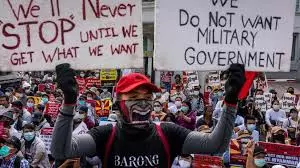
Which bloc is India on?
text_fieldsDemocratic India was once the forerunner of the Non-Aligned Movement launched to combat colonialism, imperialism, racism and apartheid, and to promote global security, peace and disarmament. Sixty years after the first summit of the movement, we have become one of the nations that have forgotten their goals. The decisions taken by India in international affairs and forums are markers of that change. When the UN Security Council discussed the resolution of the massacres and atrocities perpetrated by the military which seized power following the coup d'tat in neighbouring Myanmar, the changed attitude of the state towards democracy and dictatorship was clear. India was at the forefront of counteracting the resolution passed by Britain, which condemned the coup and called for strong retaliation. China, which has been encroaching on Indian soil and wreaking havoc on democracy in its own country, has been India's ally in weakening the resolution together with Russia, which believes that even trying to poison the opposition leader is diplomacy.
At least 67 protesters have been shot dead by the Myanmar military since the February 1 coup. The world watched as the army killed, including children, rejecting even the words of the nun who cried out on her knees not to kill unarmed men. Why are the harshly-worded criticism and the UN Security Council's convention to stop the violence that Amnesty International has condemned as murder previously unseen in world history, annoying India? The answer, though painful, is quite simple. The 'Maha-bharat' truth is that these are the same tactics that India has in store for its citizens, demanding their rights and the survival of democracy. This change in language can be easily understood from the way the government dealt with the student movements, anti-CAA/NRC protests and the farmers' protests.
Recent reports from the American human rights group Freedom House and the Swedish V-Dem Institute exposed the same to the world. Freedom House says India has become a partially free country. V-Dem points out that the once democratic India has now turned into an electoral autocracy like Pakistan. The government is attacking the press and civil society, spreading propaganda against dissidents and creating disunity in society, the report adds. Looking at how the government has been acting recently, this is hard to dismiss, even for the strongest of nationalists. The same Amnesty International who could express their discontent at the developments in Myanmar had to shut their offices in India and leave a few months ago.
India responded severely when the Freedom House report came out. The MEA spokesperson replied that India doesn't need sermons on democracy from those who did not give their citizens their fundamental rights. Indeed, India does not need to be taught democracy from others. This used to be a nation with a history of dialogue, discourse and tolerance with a strong constitution that supports any individual's rights and struggles. Those ruling should look back on those lessons. That alone would suffice so that the values upheld by the nation are not frozen stiff and its people not dying in the streets.






















